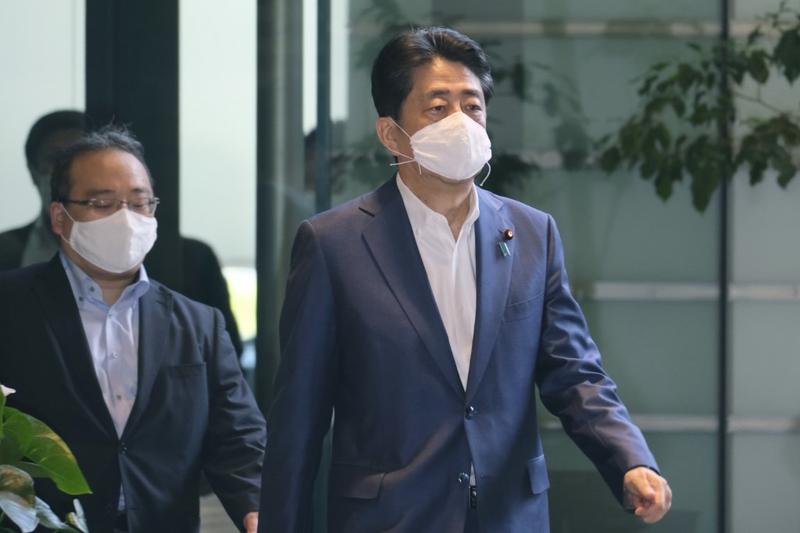 Japan's Prime Minister Shinzo Abe (center) arrives at the prime minister's office after a visit to the hospital, in Tokyo, Japan, on Aug 24, 2020. (KAZUHIRO NOGI / AFP)
Japan's Prime Minister Shinzo Abe (center) arrives at the prime minister's office after a visit to the hospital, in Tokyo, Japan, on Aug 24, 2020. (KAZUHIRO NOGI / AFP)
TOKYO - Japan's Prime Minister Shinzo Abe wants to take care of his health and do his utmost at his job, he said on Monday, after a second hospital visit within days sparked concern whether he could stay on as leader of the world's third biggest economy.
The visit came as Japan's longest-serving prime minister surpassed a record for longest consecutive tenure as premier set by his great-uncle Eisaku Sato half a century ago, adding to speculation Abe could resign after reaching the milestone.
Abe, criticized for his handling of the coronavirus outbreak and some scandals, has suffered a slide in voter support to one of the lowest levels since returning to office for a second term in 2012 with promises to revive the economy and bolster defense.
I'd like to take care of my health and do my best at my job.
Shinzo Abe, Japan's prime minister
"I'd like to take care of my health and do my best at my job," Abe told reporters at his official residence, after visiting a Tokyo hospital where he said he had received results of an exam done last week and undergone additional examinations.
Abe, who turns 66 next month, also said he wanted to speak again later about his medical tests.
ALSO READ: Abe to return to work after 3-day break marked by hospital visit
Earlier, government spokesman Yoshihide Suga said Abe was having a follow-up to a check a week ago when his examination lasted 7-1/2 hours, fuelling worries about his health.
But major broadcaster Nippon TV said Abe was being treated for a chronic illness rather than a check-up, citing multiple unidentified government and ruling party sources.
Abe has been prime minister since 2012 in his second stint after a troubled term from which he resigned abruptly in 2007, because of struggles with ulcerative colitis, a disease he now keeps in check with medicine that was not previously available.
'Not at all' worried
His office did not give a detailed explanation for the hospital visits, but close aide Health Minister Katsunobu Kato said last week's visit was a regular check-up and he was "not at all" worried about Abe's health.
READ MORE: Japan PM 'has hospital check-up' amid health concerns
Japanese media have speculated about Abe's health this month, including detailed reports on his walking speed.
If Abe is incapacitated, Deputy Prime Minister Taro Aso, 79, who doubles as finance minister, would take over temporarily as acting prime minister
Weekly magazine Flash said Abe had vomited blood at his office on July 6. Reuters was unable to verify the widely cited report, which was denied by government officials.
Abe gets a regular check-up twice a year, with his most recent on June 13, Kyodo news agency said, adding that last week's visit was a follow-up to a June check-up, citing a hospital source.
If Abe is incapacitated, Deputy Prime Minister Taro Aso, 79, who doubles as finance minister, would take over temporarily as acting prime minister.
If Abe says he has decided to resign, he would stay on until formally replaced, which requires a ruling Liberal Democratic Party (LDP) presidential election, followed by the winner's formal election in parliament.
READ MORE: How possible successors stack up if Japan PM Abe resigns
Abe's tenure as LDP president, and thus, premier, ends in September 2021 unless he steps down earlier.
Those tipped as possible successors include Aso, former defense minister Shigeru Ishiba, ex-foreign minister Fumio Kishida, Suga, and Defence Minister Taro Kono.
All are veteran LDP lawmakers unlikely to make huge policy shifts, despite differing over details.
But any successor may find it tough to emulate Abe's political longevity, which followed years of revolving-door premiers and was aided by the strong economy, tight control over bureaucrats and weak opposition parties.


